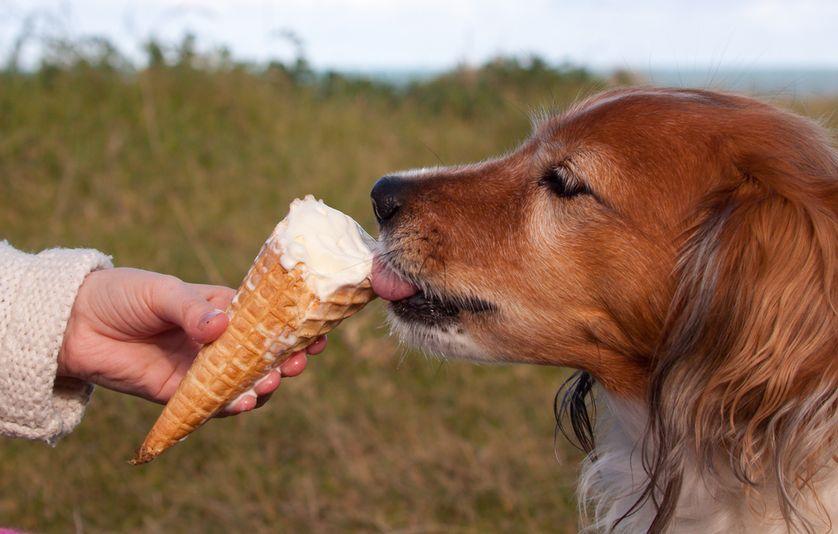Some foods that we, as humans, eat day-to-day can seem perfectly safe to share with our dogs. But, some everyday foods are toxic to dogs. But, which ones? Is it bad to feed dogs human food…?
5 Common Foods That Can Be Fatal For Your Dog

Is It Bad To Feed Dogs Human Food?
We know how hard it can be to say no when your dog is looking up at you with those puppy-dog eyes, begging for a taste of the food on your plate. But if you give in, you could be risking your dog’s health without knowing! Some of the foods that are commonly found in our everyday meals and snacks, can be extremely toxic to our four-legged pals.
To help you know which ones to keep your pooch away from, we have put together a list of foods you should avoid giving your dog at all costs.
1. Xylitol (Artificial Sweetener)

What is it?
Xylitol is an artificial sweetener, which is often used in sugar-free products or low-fat products. It replaces the use of sucrose (sugar), and it’s just as sweet. It can be found in foods you might not expect such as peanut butter, as well as the obvious sugary snacks. It’s always worth checking the labels of baked goods, condiments (especially items like peanut butter!), and cereals.
What will it do to my dog?
If your dog digests xylitol there is a risk that their blood sugar will drop which is not a good thing. In extreme instances, this can lead to hypoglycemia (low blood sugar) causing loss of consciousness and sometimes even death. Visible symptoms of hypoglycemia include first vomiting, and then trembling, lethargy, and seizures and they may seem uncoordinated.
In serious circumstances, the ingestion of xylitol could cause necrosis (liver damage), where a huge number of liver cells abruptly die. This often has fatal results. The smaller your dog, the less xylitol it needs to consume in order for it to have dangerous implications.
What you should do
You need to act fast if your dog has digested xylitol, as it can take effect as quickly as 30 minutes after consumption. Symptoms will continue to show up to 12 hours after. Your veterinarian will diagnose the seriousness of it, but treatment often includes hospitalization.
Cooked Bones & Fat Trimmings

What is it?
You know those bits of fat on the edge of cuts of meat? The really tasty, but extremely unhealthy parts – well what do you do with them? Leaving it out for your dog to eat could be very dangerous. And what about the bones?
What will it do to my dog?
It would be easy to assume that the term “feed the dog a bone” would include the bones from your plate, but in fact, bones that have been cooked are much easier to break and crack. If you let your dog chew at them, they could break in their mouth and get stuck down their throat. Watch out for symptoms or signs of discomfort, because the broken bones could also cut their insides or cause constipation. In worst case scenarios, they could pierce your dog’s gut which could be fatal! Watch out for bloody stools, bloating (which can be fatal for dogs), or vomiting.
As for the fat, this can cause pancreatitis, which is a disease where the pancreas becomes inflamed. Your dog might experience discomforts such as vomiting, loss of appetite, or abdominal pain from the excess consumption of this fat.
What you should do
The first thing to do is calmly remove any remaining food from the dog’s reach or from their mouth if you can. Don’t move suddenly though, because dogs are often territorial about food, and with sudden movements, they might try to swallow it quickly. Once the food is out of sight, call your veterinarian, and they will talk you through what should happen.
Avocado

What is it?
Avocado has become an extremely popular part of household buys in the past few years, following the trend of healthier diets and lifestyles. But, your pup shouldn’t eat it with you!
What will it do to my dog?
Avocados contain something called persin, which many animals, including dogs, are allergic to. Persin is present in the avocado plant, including the pit, leaves, and the fruit itself. When dogs consume any part of the avocado plant, they may experience vomiting and diarrhea, but in cases of high consumption, it could lead to pancreatitis, or even be fatal.
What you should do
If you grow avocado plants at home, make sure it is well out of reach of your dog. You know they can be curious, so don’t let them make the mistake of chewing at the avo!
If your dog does eat some avocado, or a part of the plant, call the veterinarian and take them for a diagnosis. In most cases, dogs will recover from persin poisoning with the treatment prescribed.
Onion & Garlic

What is it?
Any food that is in the onion family, including garlic, can be poisonous to dogs. Whether they are raw, cooked, or in powder form, a substantial amount of onion or garlic can be harmful to your pooch.
What will it do to my dog?
Onions contain a substance called thiosulfate, which dogs don’t have the ability to digest. You can imagine how uncomfortable their stomachs will feel! When dogs consume onions or garlic, the food might kill a large number of red blood cells, which can lead to anemia. If your dog eats a substantial amount, signs you will need to look out for are weakness, vomiting or breathing problems. Consuming a large amount at once may be less problematic than consuming a small dose over a longer period of time.
What you should do
Consulting the veterinarian as soon as possible is essential, then they can carry out any necessary procedures. It might involve flushing out the stomach or inducing vomiting.
Salty Snacks

What is it?
Salt can be found on numerous snacks, such as chips and pretzels, and it’s a well-used feature on every dinner table. Salt has the ability to dehydrate minds and bodies in all animals, including dogs. Salt dries out moisture and destroys blood cells. Have you ever experienced a headache when you’ve eaten something super salty? Well, high levels of dehydration can be dangerous for your dog, and it takes a lot less for them to dehydrate than it does us.
What will it do to my dog?
Due to the dehydrating effects of salt, consumption of a salty snack can cause excessive thirst and urination – you might want to keep the garden door open – and too much can lead to sodium ion poisoning.
If your dog has eaten a lot of salt, the effects can be worse than a bit of thirst. Signs of overdoing the salt could be headaches, vomiting, diarrhea, shakes, depression, lethargy, high body temperature, and seizures. In some cases, it can be deadly.
What you should do
The first thing to do if you know your dog has eaten a salty food is to give them a large bowl of water. Rehydrating them is the first step toward avoiding salt poisoning. As soon as you’ve done that, call the vet. In some circumstances, hospitalization may be necessary for treatment, but the veterinarian can help diagnose how serious the situation is.
What Human Food Can Dogs Eat?

If you’re ever unsure about whether a food will harm your dog, don’t give into their adorable little faces. I know, I know, your dog is the smartest dog around, but even they won’t know if that food is bad for them or not.
Get yourself clued up on what people foods could be dangerous for your dog with our handy guide below, and keep them away from anywhere your dog can reach…

If your pooch does get their paws on something potentially toxic, always call your veterinarian, and keep your dog calm.
Sources
Author Dr. Kay, Nancy DVM DACVIM “Popular Xylitol Products That Can Poison Your Dog” Pet Health Network, Aug 24. 2021 https://www.pethealthnetwork.com/dog-health/dog-toxins-poisons/popular-xylitol-products-can-poison-your-dog
Author Finlay, Katie “What To Do If Your Dog Eats A Chicken Bone” American Kennel Club, Jun 22. 2017 https://www.akc.org/expert-advice/health/what-to-do-dog-eats-chicken-bone/
Author Burke, Anna “Can Dogs Eat Avocado?” American Kennel Club, Feb 06. 2019 https://www.akc.org/expert-advice/nutrition/can-dogs-eat-avocado/
Author Arnold, Brandy “My Dog Ate Onion – What Now?” Dogington Post, Sep 24. 2014 https://www.dogingtonpost.com/my-dog-ate-onion-what-now/
Author Hollinger, Hannah “Salt Poisoning In Dogs” Wag Walking, Nov 24. 2021 https://wagwalking.com/condition/salt-poisoning
 C
C



